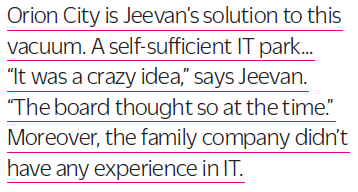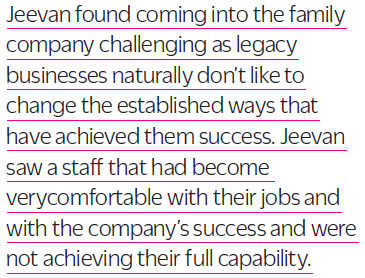How I Did It - Jeevan Gnanam
LIVING UP TO A LEGACY The rebel who ventured out on his own, Jeevan Gnanam has returned to St. Anthony’s Group to take the family business in new directions. St. Anthony’s Group is a family enterprise now transitioning to a third-generation family leadership. Jeevan Gnanam, one of Founder A Y S Gnanam’s grandchildren, is obsessively focused on the challenges of leading a […]
LIVING UP TO A LEGACY
The rebel who ventured out on his own, Jeevan Gnanam has returned to St. Anthony’s Group to take the family business in new directions.
St. Anthony’s Group is a family enterprise now transitioning to a third-generation family leadership. Jeevan Gnanam, one of Founder A Y S Gnanam’s grandchildren, is obsessively focused on the challenges of leading a family business that’s transitioning to third-generation family leadership. Besides all the regular challenges of running a business, family businesses also have unique ones like dealing with members who perform appallingly as managers of units and feuds triggered by decades-old incidents. Management consultants, mediators and shrinks find rich assignments dealing with family firm issues. Jeevan Gnanam is acutely aware of the challenges ahead of him as a third-generation leader. He has made a mark by diversifying the group’s business into new and profitable areas and reviving the fortunes of the St. Anthony’s Industries legacy firm as its Chief Executive.
Although Jeevan grew up surrounded by his grandfather’s tales of the family business and was keenly aware of the large role it played in his family, when he returned to Sri Lanka following his education in the US, he partnered his brother to launch an e-commerce site, kade.com. It was 2007; few Sri Lankans had fast-enough Internet access for online shopping and credit card penetration was low. The online business collapsed in a heap. Jeevan counts that failure as a turning point, a significant moment in his evolution as a leader. IT was his field, and he wanted to stay in it. But realizing that services were a safer option than products, he launched Providence, which develops web applications for clients. This company was a success and today has grown to include Providence BPO. Jeevan’s involvement with these startups showed him the vacuum in Sri Lanka with regards to infrastructure for the development of IT and BPO services.
Orion City is Jeevan’s solution to this vacuum. A self-sufficient IT park, it is built on 16 acres of prime property owned by the St. Anthony’s Group on the periphery of Colombo, where factory buildings and warehouses had idled for years after the group’s synthetic cloth manufacturing business moved outside the city. This was still 2007, before the war ended and the IT and BPO culture began to boom in the country, although companies like MillenniumIT and Virtusa were already established, so the vision of a dedicated IT park was still a grand scheme. “It was a crazy idea,” says Jeevan. “The board thought so at the time.” Moreover, the family company didn’t have any experience in IT. But Jeevan succeeded in signing on Virtusa to the idea, and the St. Anthony’s Group board gave the go ahead. With IT services moving increasingly to developing countries, in Orion City, Jeevan has provided the family company an ideal opening to enter this growing field. Orion City provides end-to-end IT infrastructure solutions for IT companies and BPOs so they can focus on their work without having to think about maintenance and support services. The park also has an ‘incubation’ scheme, where small operations just starting up are provided modest spaces, with the option to relocate to larger spaces when their operations achieve traction. The park supports these organizations by allowing them to establish their office spaces with the most basic facilities. The park started at 30,000 to 40,000 square feet and has grown to half a million. The company aims to double this square footage over the next two years. Today, 24 companies with over 5,000 people work at Orion City.
 Orion City has been a personally rewarding venture for Jeevan because of the close relationship he had with his grandfather growing up. The company started work on the park shortly before A Y S Gnanam passed away, but he was very enthusiastic about the project, questioning Jeevan about its progress even in his last days. “After the textile manufacturing facility closed, he always wanted a lot of people there again because he loved people,” Jeevan says. “He was very charismatic and full of love. If he saw 5,000 people working here today, he’d be very happy.”
Orion City has been a personally rewarding venture for Jeevan because of the close relationship he had with his grandfather growing up. The company started work on the park shortly before A Y S Gnanam passed away, but he was very enthusiastic about the project, questioning Jeevan about its progress even in his last days. “After the textile manufacturing facility closed, he always wanted a lot of people there again because he loved people,” Jeevan says. “He was very charismatic and full of love. If he saw 5,000 people working here today, he’d be very happy.”
Growing up, Jeevan learned the foundations of the family business from his grandfather, who taught him about integrity and hard work through stories about his work. “It was probably his storytelling ability that engaged the younger generation of the family into the business,” Jeevan says. “I was quite fortunate to have that.” He believes these stories’ lessons have helped him achieve his success.
Identifying voids and finding solutions is clearly something Jeevan is good at. During the early days of his startups, he saw Sri Lanka’s lack of support for startups. A startup ecosystem is essential for a nation that aspires to rapid development in the coming decade. Startups are the perfect entities to test and commercialize new products, services and technologies, and are a key engine for grassroots innovation. But the very nature of startups means they need strong support, especially in terms of mentoring and finance, and this is almost impossible to achieve without an established support network. Jeevan and three partners decided to kick-start a startup culture in Sri Lanka. In college, Jeevan had first ventured into entrepreneurship after winning a business plan competition, so the partners organized a similar competition to find and support promising startup ideas. They launched Venture Engine in 2012, with aspiring entrepreneurs submitting business plans to be vetted by a panel of potential investors and the winners gaining capital and partners to jumpstart their companies. From there it was a natural step to establish a network to financially support these startups, and Lankan Angel Network was born comprising individuals who were willing to invest in startups. This has by now invested in 30 to 40 startups to the tune of $3 million. Venture Engine has now become an annual event.
After working exclusively on Orion City and Providence for three years, Jeevan brought his skills and innovative ideas to the established business of the family group when his father asked him to help manage St. Anthony’s Industries. This arm of the family group does industrial manufacturing, including of their most well-known brand, Anton. Jeevan found coming into the family company challenging, as legacy businesses, naturally, don’t like to change the established ways that have achieved them success. Jeevan saw a staff that had become very comfortable with their jobs and with the company’s success and were not achieving their full capability. The brand was successful, but Jeevan did not think it had reached its potential. Pushing the staff to perform better wasn’t easy, but Jeevan achieved this by turning to what he knew best – technology. He established a performance management system and made sure performance became the key criteria of the ethos of the management culture. He also brought in a new culture of product development and began creating new products every few months. He wants St. Anthony’s Industries to challenge the plastics industry and also diversify into different kinds of manufacturing.
 Jeevan is constantly thinking about new market trends on which St. Anthony’s can capitalize. Two companies of which he is a Director, SA Knowledge Services (SAKS) and Loops Digital Services, is a result. He founded SAKS in 2010. The company offers customized, flexible outsourcing solutions in financial services, research and analytics, and legal process outsourcing, and currently employs around 40 people. Loops focuses on social media, performing functions such as video creation, content creation and social media monitoring, and currently employs about 20 to 30 people. Both companies aim to capitalize on the potential to take care of the back-office functions of companies in Australia, the UK and the Nordic countries. “We think both these companies have good value and selling propositions,” says Jeevan. “Markets here do these functions more efficiently and at better quality than they would do so themselves.”
Jeevan is constantly thinking about new market trends on which St. Anthony’s can capitalize. Two companies of which he is a Director, SA Knowledge Services (SAKS) and Loops Digital Services, is a result. He founded SAKS in 2010. The company offers customized, flexible outsourcing solutions in financial services, research and analytics, and legal process outsourcing, and currently employs around 40 people. Loops focuses on social media, performing functions such as video creation, content creation and social media monitoring, and currently employs about 20 to 30 people. Both companies aim to capitalize on the potential to take care of the back-office functions of companies in Australia, the UK and the Nordic countries. “We think both these companies have good value and selling propositions,” says Jeevan. “Markets here do these functions more efficiently and at better quality than they would do so themselves.”
Jeevan’s grandfather ventured into business by dealing with scrap metal, but laboured over half a century to become a pioneer of industrialization in Sri Lanka, manufacturing everything from textiles to building materials and plastic products, and leaving behind a manufacturing and importing empire to his descendants. In the US, a saying “shirtsleeves to shirtsleeves in three generations” signifies how companies built by struggling grandparents usually see their end during the time of the grandchildren, who return to the poverty of their grandparents. But it is difficult to see such an end to St. Anthony’s Group with grandchildren like Jeevan at the helm, who’re building on the success of the legacy businesses, while following changing trends and leading the company into new fields and markets. Although Jeevan initially rebelled and established his first venture outside the family empire, he has come full circle to combine his forte in technology with the resources of the family business to follow in the footsteps of his enterprising grandparent.

